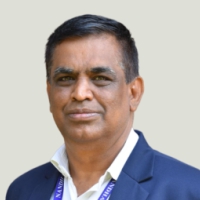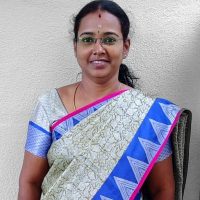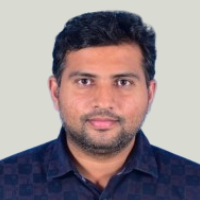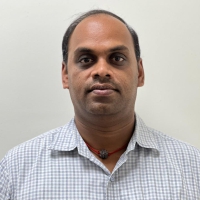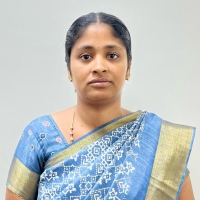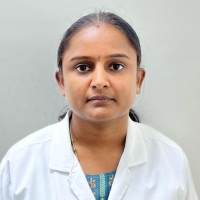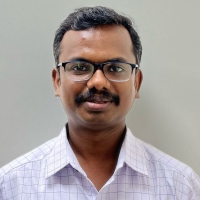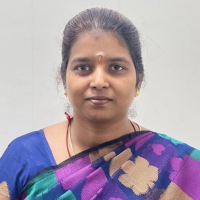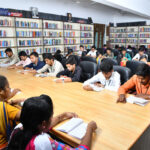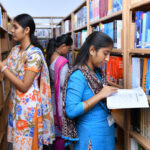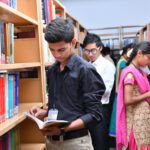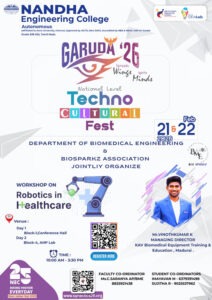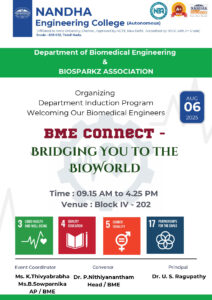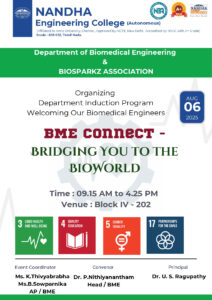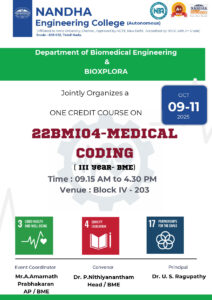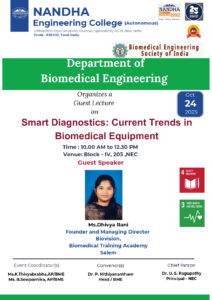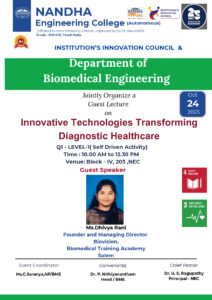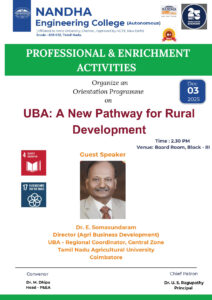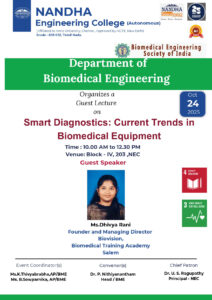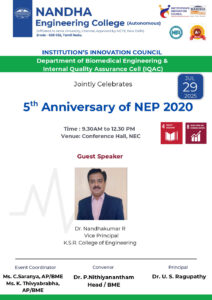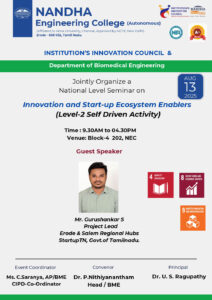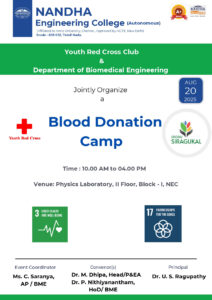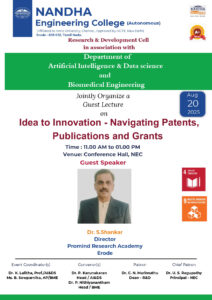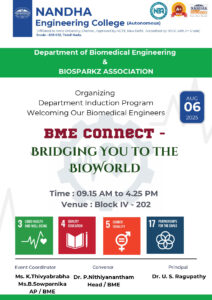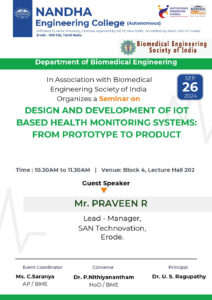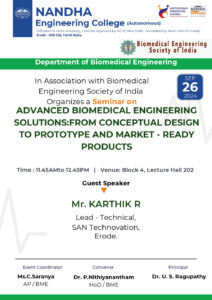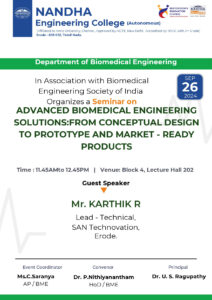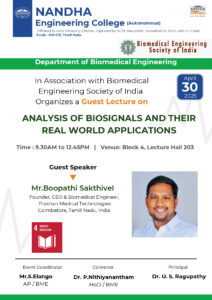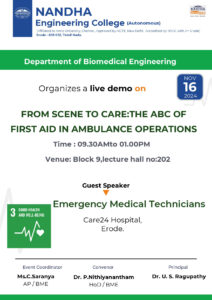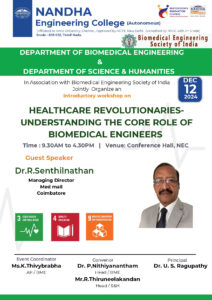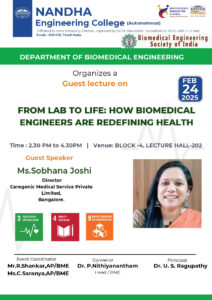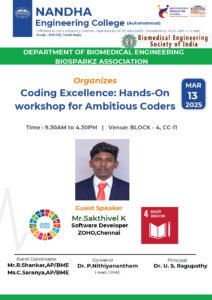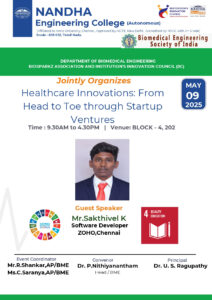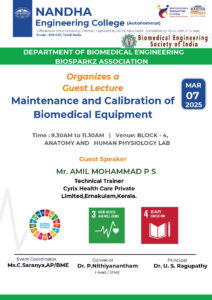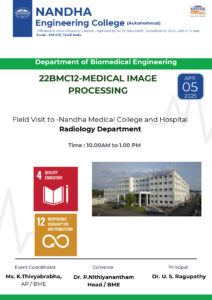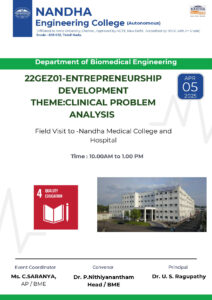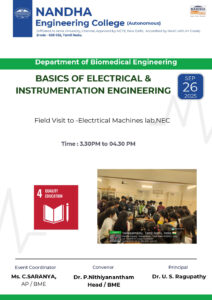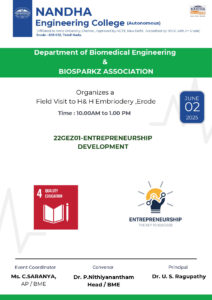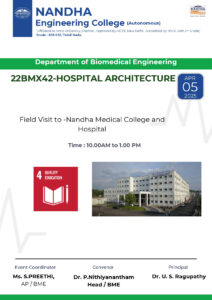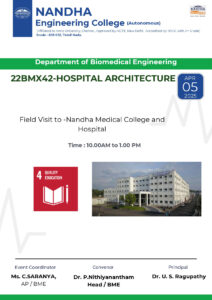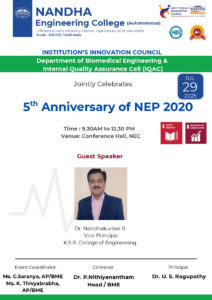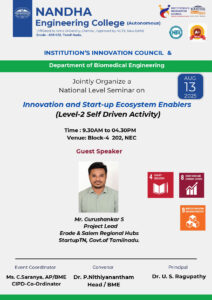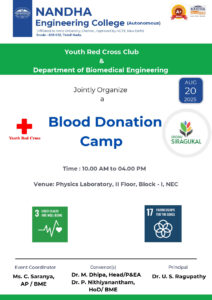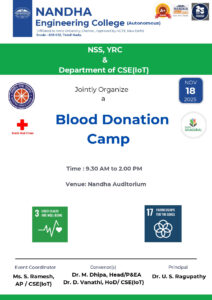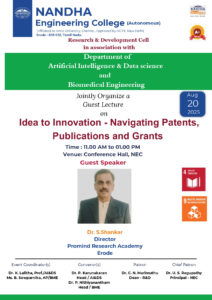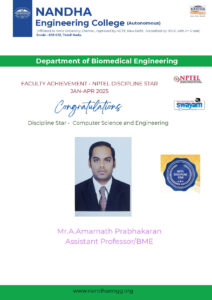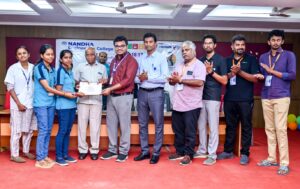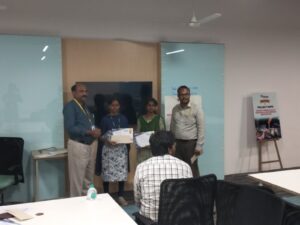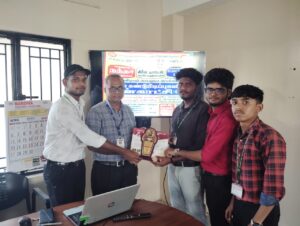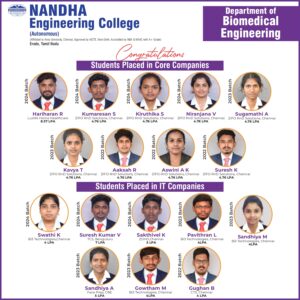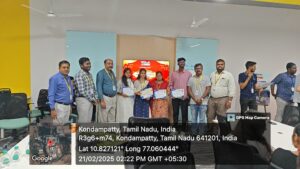
Head of the Department
Programme Offered
B.E Biomedical Engineering
Intake - 60
About the Department
Biomedical Engineering is indeed a highly interdisciplinary field that bridges biology and engineering, offering a unique blend of knowledge that drives innovation across multiple sectors. By applying biological principles to engineering design, biomedical engineers contribute significantly to scientific discovery and the improvement of healthcare systems. They play a crucial role in developing new medical instruments, diagnostic tools, and other technologies that enhance public health and healthcare delivery.
The Department of Biomedical Engineering at Nandha Engineering College was established in the academic year 2018-2019. The department boasts well-established laboratories, like, Analog and Digital Electronics Lab, Human Physiology Lab, Sensors Lab, Biomedical Instrumentation Lab, Microprocessors & Microcontrollers Interfacing Lab, Biosignal Processing Lab and Medical Image Processing Lab that provide young biomedical engineers with the opportunity to gain advanced practical knowledge in the field.
Our carefully designed curriculum ensures that students develop a strong foundation in biomedical engineering while also familiarizing them with other engineering disciplines. This multidisciplinary approach equips students to work on innovative platforms across various sectors. Graduates of this program are assured of placement opportunities in hospitals, sales and servicing companies, medical coding firms, and IT companies. Additionally, the field offers a wide range of research opportunities where students can excel and make significant contributions to society.
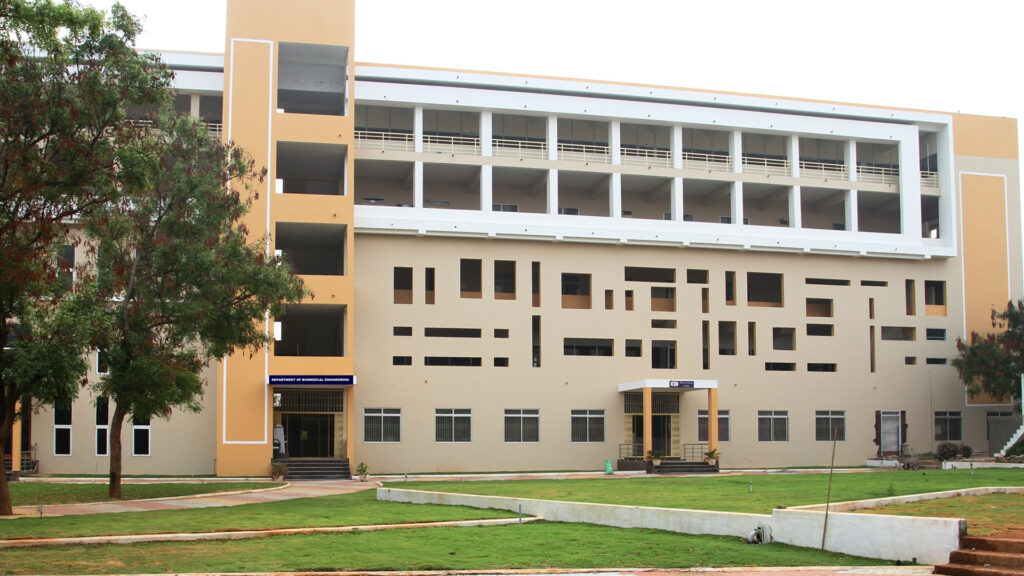
VISION
To foster academic excellence imparting knowledge in Biomedical and allied disciplines to meet the ever growing needs of the society.
MISSION
Department of Biomedical Engineering is committed
- To impart quality education and develop an aptitude for professional career and continuous learning with ethics and social responsibility.
- To provide a framework for research and innovation to meet the emerging challenges through regular interaction with healthcare industry.
- To create a learner centric environment by upgrading knowledge and skills to cater the needs and challenges of the society.
PROGRAM EDUCATIONAL OBJECTIVES (PEOs)
PEO1: Core Competency: A successful professional with core competency and inter-disciplinary skills to satisfy the Industrial needs.
PEO2: Research, Innovation and Entrepreneurship: Capable of identifying technological requirements for the society and providing innovative ideas for real time problems.
PEO3: Ethics, Human values and Life-long learning: Able to demonstrate ethical practices and managerial skills through continuous learning
PO1: Engineering knowledge: Apply the knowledge of mathematics, science, engineering fundamentals, and an engineering specialization to the solution of complex engineering problems.
PO2: Problem analysis: Identify, formulate, review research literature, and analyze complex engineering problems reaching substantiated conclusions using first principles of mathematics, natural sciences, and engineering sciences.
PO3: Design/development of solutions: Design solutions for complex engineering problems and design system components or processes that meet the specified needs with appropriate consideration for the public health and safety, and the cultural, societal, and environmental considerations.
PO4: Conduct investigations of complex problems: Use research-based knowledge and research methods including design of experiments, analysis and interpretation of data, and synthesis of the information to provide valid conclusions.
PO5: Modern tool usage: Create, select, and apply appropriate techniques, resources, and modern engineering and IT tools including prediction and modeling to complex engineering activities with an understanding of the limitations.
PO6: The engineer and society: Apply reasoning informed by the contextual knowledge to assess societal, health, safety, legal and cultural issues and the consequent responsibilities relevant to the professional engineering practice.
PO7: Environment and sustainability: Understand the impact of the professional engineering solutions in societal and environmental contexts, and demonstrate the knowledge of, and need for sustainable development.
PO8: Ethics: Apply ethical principles and commit to professional ethics and responsibilities and norms of the engineering practice.
PO9: Individual and team work: Function effectively as an individual, and as a member or leader in diverse teams, and in multidisciplinary settings.
PO10: Communication: Communicate effectively on complex engineering activities with the engineering community and with society at large, such as, being able to comprehend and write effective reports and design documentation, make effective presentations, and give and receive clear instructions.
PO11: Project management and finance: Demonstrate knowledge and understanding of the engineering and management principles and apply these to one’s own work, as a member and leader in a team, to manage projects and in multidisciplinary environments.
PO12: Life-long learning: Recognize the need for, and have the preparation and ability to engage in independent and life-long learning in the broadest context of technological change.
The students of Biomedical Engineering will be able to
PSO1: Design and develop the electronic systems to offer healthcare solutions by applying the knowledge of Mathematics, Life sciences, Engineering and Technology.
PSO2: Apply software skills, information and communication technologies (ICT) for solving the clinical problems
Memorandum of Understanding (MOU)
S. No. | Name of the MoU Company | MoU Signed Date | Number of years valid | Name of the Activity | PO / PSO |
1. | Fastpill Healthcare Private Limited, Medmall unit, Coimbatore. | 12.12.2024 | 5 Years | SEMINAR : Healthcare Revolutionaries – Understanding the core role of Biomedical engineers | PO1, PO2, PO3, PO4 |
2. | Infinity Biomedicals, Coimbatore. | 10.08.2024 | 2 Years | SEMINAR : Innovating the Future: Startup Opportunities and Challenges in Biomedical Field | PO1, PO2, PO3, |
3. | Prashan Medical Technologies, Salem. (Renewed) | 06.11.2023 | 2 Years | One Credit Course on LabVIEW, Medical Equipment and Calibration. | PO1, PO2, PO3, PO4 |
4. | Caliber Embedded Technologies, Salem | 18.10.2023 | 4 Years | Value Added Course: Embedded Product Design & IOT. | PO1, PO2, PO3, PO4 |
5. | Bioxplora, Coimbatore | 04.08.2023 | 3 Years | SEMINAR: How To Become a Medical Coder. | PO1, PO2, PO3, |
6. | Mechsoft Technologies, Erode | 22.06.2023 | 2 Years | Consultancy & Industry Training | PO1, PO2, PO3, PO4 |
7. | Atheenapandian Private Ltd., Tenkasi | 09.03.2023 | 10 Years | SEMINAR : Art of Job Searching in Biomedical Industry | PO6, PO7, PO8, |
8. | Medingers Healthcare Solutions, Erode | 10.02.2023 | 3 Years | SEMINAR : Innovation in Healthcare Equipment and patent filing. & Industry Visit | PO1, PO2, PO3, |
S No. | Reference No. | Client Name | Address | Project Domain/Title | Project Estimation | Cost of the Project | Project Coordinators | Project Start Date | Project Completion Date | Project Status |
1 | NEC/BME/2024-25/Consultancy/01 | Kaar Infotech Private Limited | Kumaran Nagar, Vadamugam Vellode, | UV-Integrated Floor Cleaner for Bacterial Elimination | 37500 | 38360 | Dr.M.Dhipa | 30.10.2024 | 20.01.2025 | Completed |
2 | NEC/BME/2024-25/Consultancy/02 | Mechsoft Technologies | Kaikolar Thottam, | Public Friendly Sanitary pad dispenser | 37500 | 39620 | Dr.M.Dhipa | 08.11.2024 | 20.01.2025 | Completed |
3 | NEC/BME/2024-25/Consultancy/03 | Mechsoft Technologies | Erode | Medicine vending Machine | 25000 | 26270 | Dr.M.Dhipa | 10.10.2024 | 20.01.2025 | Completed |
4 | NEC/BME/2024-25/Consultancy/04 | Prashan Medical | Coimbatore. | Patient Monitoring System Troubleshooting &Calibration | 98,000 | 100000 | Dr.P.Nithiyanantham, | 11.12.2024 | 04.02.2025 | Completed |
5 | NEC/BME/2024-25/Consultancy/05 | MED MALL | Coimbatore | FlexWalker | 70,000 | 70800 | Mrs.K.Thivyabrabha | 01.11.2024 | 10.02.2025 | Completed |
6 | NEC/BME/2024-25/Consultancy/06 | Erode Surgicals | Erode | Smart Dustbin | 30000 | 31800 | Mrs.K.Thivyabrabha | 15.11.2024 | 17.02.2025 | Completed |
7 | NEC/BME/2024-25/Consultancy/07 | Capital Surgical Devices | Erode | Mediwear | 97,500 | 99610 | Mrs.C.Saranya | 06.11.2024 | 04.03.2025 | Completed |
|
Project Title |
Principal Investigator |
Co-Principal Investigator |
Total Amount |
|
Development of an Eco-Friendly and Automated Sanitary Pad Disposl System |
Mr.A.Srithar, Department of Biomedical Engineering |
Dr. M. Manikandan, Department of MechancialEngineering Dr.M.Dhipa, Department of Biomedical Engineering |
30,000 |
|
Snorevix – IOT based Smart Pillow Snore Supression |
Ms.C.Saranya, Department of Biomedical Engineering |
Ms.N. Raji, Ms.A. Rachel, Ms.P.Deepsika – III Year – BME, Department of Biomedical Engineering |
25,000 |
Supporting Staff Members
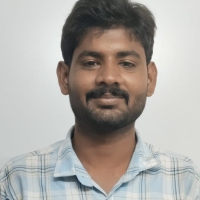
Mr.Sudhakar M N
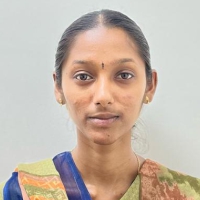
Ms.Madhumitha T
Department Laboratory
The Biomedical Engineering (BME) Laboratory provides hands-on experience in the application of engineering principles to the analysis and design of biological systems and medical technologies. The lab is designed to bridge theoretical knowledge with practical skills, offering students and researchers exposure to cutting-edge tools and techniques used in modern healthcare and biomedical research.
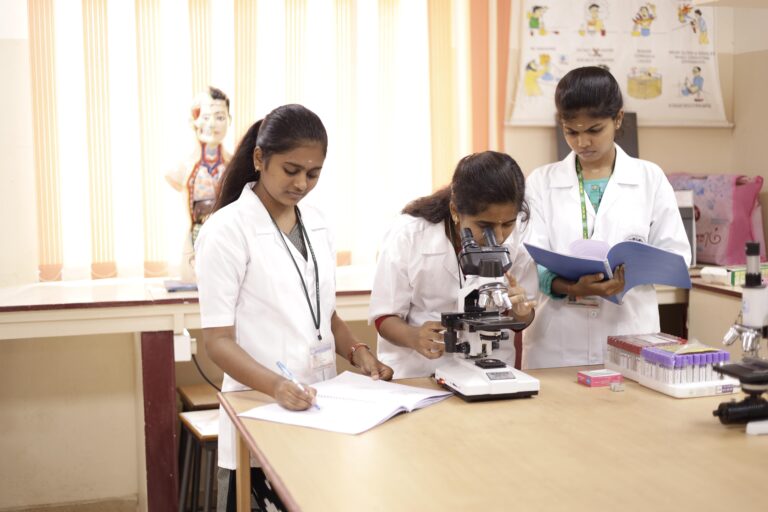
Anatomy and Human Physiology Laboratory
The Anatomy and Human Physiology Lab gives students a chance to learn about the human body through hands-on activities. Using models, dissections, and experiments, students explore different body systems like the heart, lungs, nerves, and muscles. They also learn how to collect blood, identify blood groups, and test things like bleeding time, hemoglobin levels, and blood cell counts. By connecting what they learn in class with real-life tasks, students improve their problem-solving skills.
Sensors and Measurements Laboratory
The Sensors and Measurements Lab introduces students to the fundamental principles of how sensors are used to measure physical and physiological parameters in healthcare and engineering applications. Through a series of hands-on experiments, students learn how to analyze the behavior of different types of sensors, understand their characteristics, and work with signal conditioning and measurement circuits. The lab focuses on accurate data acquisition, calibration techniques, and the selection of suitable sensors for specific applications. By the end of the course, students gain practical skills in designing and testing sensor-based systems, interpreting sensor outputs, and applying their knowledge to solve real-world problems in monitoring, diagnostics, and instrumentation.
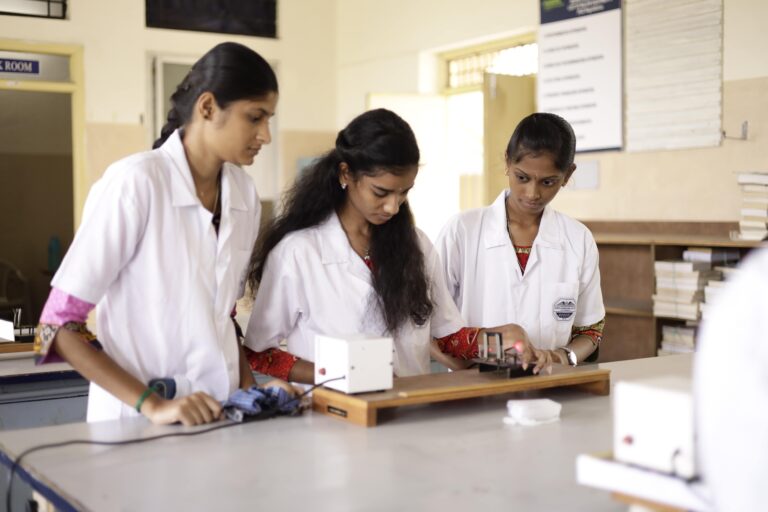
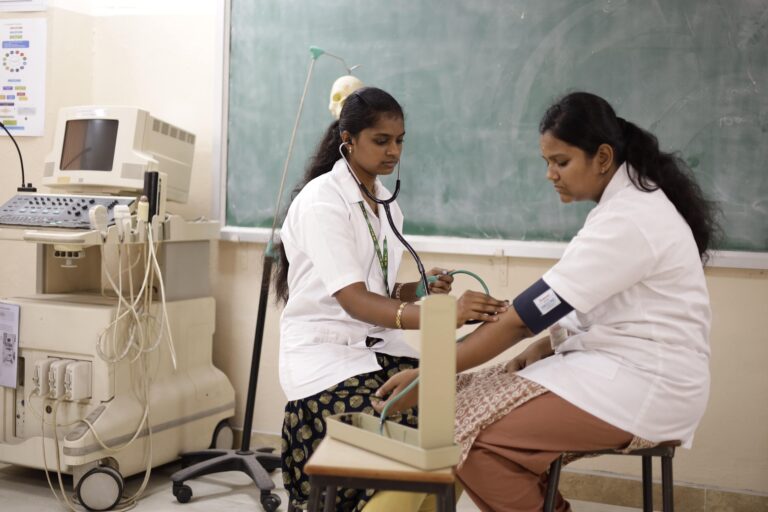
Biomedical Instrumentation Laboratory
In the Biomedical Instrumentation Lab, students engage with practical aspects of biomedical devices that interface with the human body. Experiments include ECG, EMG, EEG signal acquisition, amplifier design, and noise filtering. Students design and troubleshoot circuits to measure and display biopotentials safely and effectively. This lab bridges the gap between human physiology and electronic systems, allowing students to understand how instrumentation supports patient monitoring. Learning outcomes focus on circuit design, signal acquisition, and interpreting bio-signals for clinical application. Students gain valuable insights into the design and functioning of medical equipment, equipping them with skills necessary for careers in medical device development and hospital equipment maintenance.
Diagnostic and therapeutic Laboratory
The Diagnostic and Therapeutic Lab offers students exposure to a range of devices used in disease diagnosis and treatment. Equipment such as pacemakers, defibrillators, ventilators, dialysis machines, and diathermy units are studied in-depth. Students analyze the operational principles and safety standards of these devices. The lab promotes the understanding of how therapeutic equipment interacts with human systems and improves patient outcomes. Learning outcomes include the ability to evaluate device functions, safety mechanisms, and clinical implications. This hands-on experience is vital for students aspiring to work in hospitals or the medical device industry, ensuring they can manage, troubleshoot, and support therapeutic interventions effectively
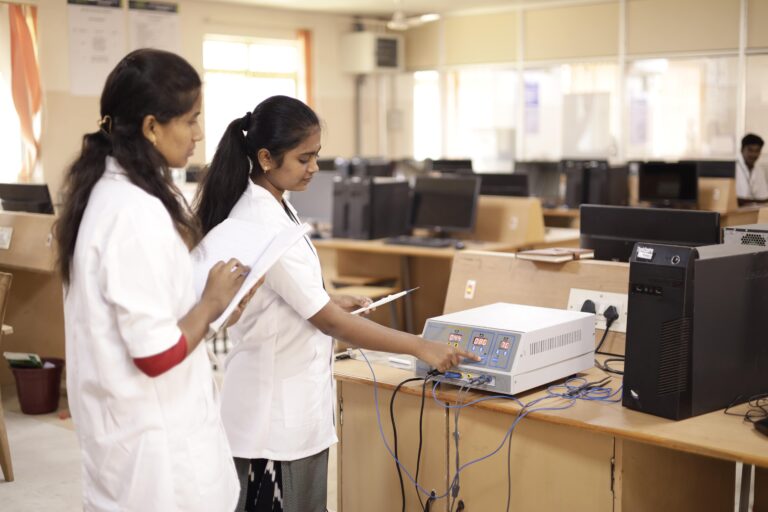
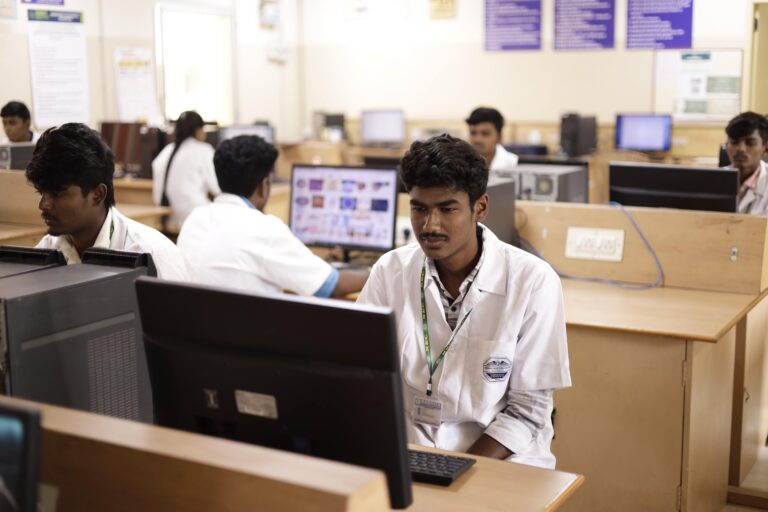
Biosignal Processing Laboratory
The Biosignal Processing Lab helps students learn how to analyze and understand signals from the human body, such as ECG, EMG, and EEG. Students practice removing noise, converting signals into digital form, and extracting important features from the data. They also learn how to apply transforms and analyze signals in both time and frequency domains. The lab focuses on building and testing algorithms that support medical diagnosis. By the end of the lab, students gain strong computational skills and a clear understanding of how biosignal processing supports smart healthcare systems, real-time patient monitoring, and clinical decision-making.


